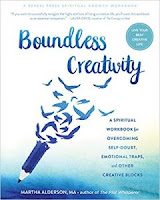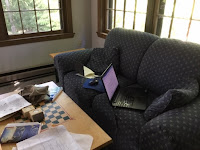The New England Society of Children's Book Writers and Illustrators was bummed this past week by the news that the
University of Rhode Island is closing the Whispering Pines Conference Center and Environmental Education Center at its W. Alton Jones Campus in West Greenwich. This was the site of the
NESCBWI Whispering Pines Retreat for nearly 25 years. Though this fall's retreat had been cancelled, for obvious reasons (I'm looking at you 2020 Pandemic), it looks as
if planners were thinking about 2021 before the closure news broke.
Many people attended this retreat annually. It was sort of an intellectual, creative get-together for them and friends/colleagues. My guess is that the NESCBWI will be able to move on and find another site where writers can have the same kind of experience. Change can be good. Embrace the change. Look forward to new opportunities. Ommm.
Personally, I only went to Whispering Pines twice.
Gail At Whispering Pines
I first attended Whispering Pines in 2006 as a featured writer or mentor/staff member. I don't recall what I was called. This was back in the good old days, because 2006 was two years before 2008 when publishing was hammered by a recession. (This year, we call 2008 the good old days.) I was very
pumped up by the experience. I hadn't been there twenty-four hours before I was thinking about graduate school, as I used to do every few years.
While ruminating still more about my first Whispering Pines experience, I
got over my interest in graduate school. I mean, I was over it in days. In part this was due to the fact that the Whispering Pines staff put me up in what is known as the Eisenhower Suite, though I just learned that Ike never slept in it during his visits with Alton Jones. He never stayed overnight there at all. Oh, no! The suite had a private bathroom, though. Even distance MFA programs usually have a residential requirement at some point on a college campus with a traditional housing situation. After Whispering Pines, the concept left me cold. The place spoiled me.
In 2010
I went back to Whispering Pines as a day participant. While there I had one of my first experiences with how sophisticated SCBWI members are in critique groups.
And Now...Pictures!
All my Whispering Pine pictures are from 2006. They are interesting because they are so totally focused on what interests me--walking and eating. My Facebook Friends will confirm that I rarely post about anything else.
First off, the main building. On the campus, there are others where workshops were held and conference participants slept. We had our meals here, and the faculty slept here. I guess I was feeling self-involved and didn't take pictures of anything else.



My weekend at Whispering Pines was jam-packed with literary and people stuff. I did squeeze in a walk of around 20 minutes, if memory serves me.

Another view of the so-called Eisenhower Suite. It was a little rustic, but there was plenty of room to roll out a yoga mat. Years later, I would attend another weekend retreat as a participant. I did swing a room by myself, and it did have a private bath. But it took "rustic" to a whole other level. The Eisenhower Suite was presidential in comparison.

Last, and most importantly, the buffet. There was also a wine bar available the first night. (Maybe the second, too. I don't remember.) I do like a glass of wine with dinner. Whispering Pines had a reputation, at least in the past, for good food. In fact, I have a family member who attended a weekend event there who found the food
too good. In my very limited experience of retreat sites, this place did, indeed, have very good food.
I have a couple of pictures of the dining room, but they're blurry. I have standards to maintain here at
O.C.
So Whispering Pines was a lovely spot. But as I am always saying here, on the rare occasions that I go to conferences/retreats/workshops, I am interested in content. I'm sure the Whispering Pines team can bring their well-regarded content to another site.
 The Locus Awards for 2020 were announced yesterday as part of a virtual weekend event. Dragon Pearl by Yoon Ha Lee won in the YA category.
The Locus Awards for 2020 were announced yesterday as part of a virtual weekend event. Dragon Pearl by Yoon Ha Lee won in the YA category.









































